Yucatan News: Spay Clinic for Cats
News Starting July 05, 2010
>
Hurricane Alex Support Center
Yucatan was spared during Hurricane Alex, but there has been damage in Nuevo Leon, Tamaulipas, and Coahuila. The hardest hit was Monterrey, which now has more than 210,000 people without water and 170,000 without electricity. Just today there was news of people drowning in floods. Eleven are dead in Nuevo Leon. Initial relief efforts from Yucatan will be made in Nuevo Leon, then in Tamaulipas and finally in Coahuila. The collection center in Merida will be in the Chichen Itza Salon in the Siglo XXI Convention Center. People are in need of bottled water, medicine, and food. This is a government-managed collection, separate and apart from the Red Cross or any other organization. The collection center is expected to be open for approximately the next two weeks. As of now, rain continues to be expected in 25 of Mexico’s 31 states and 10,000 km of water lines have been damaged in Monterrey, so this need can be expected to last for some time. Many thanks to anyone who can contribute to this cause – or to any other cause whose mission it is to help the people who suffer at the hands of hurricanes, floods, and earthquakes in Mexico.
A Quick Word About CFE
It is a national pastime, in almost every nation on the planet, to complain about utility companies. Utility costs are too high. Service is too slow. On and on it goes. However, every time there is a hurricane, or any other natural disaster, in Mexico, we see up to hundreds of thousands of Mexicans without power over huge areas of the country. It is an amazing thing to watch how many CFE trucks appear, how soon they are on the scene, and how rapidly service is restored. Hurricane Alex was a relatively small storm that did serious damage over a limited area of Mexico. Yet, 2200 workers and 400 trucks are working to restore power in Monterrey. We remember how quickly electricity was restored to Merida after Hurricane Isidor, the most recent big one here (2002). Many thanks to all of the CFE employees who come from all over the nation to help in time of trouble. We hope they realize how deeply they are appreciated.
Low Cost Cat Spay/Neuter Clinic
Planned Pethood will conduct a low cost spay/neuter clinic for cats only in their offices on Sunday, July 18. Please contact Planned Pethood for an appointment at 9-44-23-10.For more information on Planned Pethood, please visit their website. Space is limited, so schedule your appointment today! Prices are significantly reduced to encourage the spay/neuter of these animals. Maybe you don't have a pet that needs this... but we're willing to bet you have a neighbor that does!
Location: Planned Pethood, 60 North No. 344 x 3 y 3-C in Colonia Gonzalo Guerrero (on 60 North in front of CBTIS 120, one and a half blocks before SAT
Time: By appointment
Cost: Male cats: 200 pesos, Female cats: 300 pesos
Yucatan Living’s Merida Art Map is On the Map
We have been pleased to discover that our Merida Art Map has been included in the 2010 Directorio Nacional de Cultura’s 2009 – 2010 directory of museums, galleries, cultural centers, foundations, ONGs, online resources, and cultural institutions in Mexico and beyond. This is a comprehensive directory that includes the websites of many of the artists and cultural hubs in the nation. They are conveniently organized by state, so Yucatan is easy to find and interesting to read. Check out the Directorio Nacional de Cultura 2009 – 2010 to see if your favorite art venue is there, and as a handy directory for any travels you do within Mexico.
A Month at Playa Anahuac
From July 18 to August 15, thousands of young people will attend the third year of Playa Anahuac in Chicxulub. This is one of the most impressive societal and character building events we have ever seen. Throughout the four weeks, there will be non-stop activities for the young people who attend this learning experience. The sections of the program include Dance Night, Sport & Health, Family & Style, Life & Spirit, Kids & Fun, and Eco & Life. At the same time you are seeing volleyball on the beach with some of the attendees, others will be volunteering at the local nursing home. When you hear music from their dance concert, you can know that they will have spent the day cleaning the beach. Who they are and their place in the physical and spiritual world are topics they will study. This month, aimed at growing the next generation of Yucatecos as simply fine human beings and citizens, is one of the most important events we think happens in our state all year round.
Progreso to Get Second Mall
The growth in Progreso is often astonishing to expats who have lived in the area since that city really was a sleepy little fishing village. The new mall will be located on Calle 80 x 27 y 29, with openings on Calles 27, 29, 80 and 82. There will be over 50 shops in the mall, as well as 100 spaces for artisans from Casa de la Cultura. The mall will also serve as a drop-off point for tourists on cruise ship days. We did not see any discussion of parking, so we will be watching this project develop with a great deal of interest. It is believed that the new mall will create new jobs, as well as provide a boost to business and tourism in general. The new mall is expected to open in March, just in time for the Easter holidays. Every month, it seems as if something new and wonderful is coming to Yucatan’s coastal area. It will be interesting to see this new mall develop and add to the progress of Progreso.
American Spanish Teachers Brought Student Visitors
This summer, 3 American Spanish teachers brought their students to visit along the east coast of the Yucatan Peninsula. This was a great experience for the students because they were able to make their way throughout their trip by using their knowledge of Spanish. The teachers were particularly proud of the students because they left behind any biases they might have had against people of other cultures or against people who speak a different language than they speak. We believe that these kinds of exchanges between the young people of different nations very well may be the one thing that can save us from ourselves in the not too distant future. Their teachers were proud of the students and so are we. Visit the story of their visit to learn more.
English Classes in Izamal
The Rotary Club of Izamal is sponsoring English classes in Izamal beginning today, July 5, 2010. The classes are one month in duration and are held on Monday through Friday. The cost for the course is $100 pesos. It was stressed that the classes are for all ages, but times were given only for the children’s classes. Those include 4:00 PM to 5:00 PM for 3rd and 4th graders and 5:00 PM to 6:00 PM for 5th and 6th graders. The Rotarians in Yucatan, along with many nort- of-the-border Rotary friends, always seem to know just what is needed in Yucatan at just the right time. Izamal is entering a new era in which it will join not only a thriving tourism industry, but the growing import/export industry as well. These classes will open doors to jobs and, in the end, that is what counts no matter where one lives. As always, Rotary is deeply appreciated wherever they go because they truly understand what it means to serve the needs of the people.
Hurry Hurry Habanero!
Not long after we reported that Yucatan has more demand for our habaneros than we are currently producing, foreign investors, such as Herdez, La Costeña, Heinz and Sabritas, quickly showed interest in investing in the production of habanero chile throughout the three peninsular states that have been designated as the Origin of the Habanero. What we like about this is that, in order to claim that their products come from the home of the habanero, they will have to join a consortium of local growers and actually use only the habaneros that are grown here. This will ensure a brighter than ever future for the habanero growers of Yucatan and increase our exports exponentially. Our congratulations to all concerned for everything they are doing to guarantee the futures of our farmers and their families. For more about Yucatan’s habanero, read Yucatan Living’s Habanero High Noon!
Summer School at the Confucius Institute
Today marks the beginning of a new summer school for children at the Confucius Institute, which is part of the School of Anthropological Sciences at UADY. There is no age limit for these classes. The only requirement is that the child can read and write. The fee for the month-long summer school is $1,500 pesos and the children will certainly get their money’s worth! Not only will they study Mandarin Chinese (as many of the current UADY students do during the year), but they will also take exercise and fitness classes. Included in the summer school curriculum will be the use of chopsticks, the art of paper cutting, calligraphy, dance, Chinese legends and stories, mask painting, and even ping pong. What we like about this course is that students will also be exposed to a variety of methods that will help to relax their eyes and minds. The world is a stressful place and any skills such as these will put these children miles ahead of others in their age group.
This summer school is to serve as the prototype for developing an entire semester of Mandarin Chinese (and more) for children. It might be noted that children who decide to study Chinese have a bright future ahead of them as linguistic jobs for Chinese speakers continue to appear.
Cleanest Beaches are in Playa del Carmen
Yucatan Living congratulates Playa del Carmen on having received the honor of being named one of the nation’s cleanest beaches, with contamination rates of less than 10 enterococci (MPN) per 100 ml of water. A beach is not labeled contaminated unless it reaches 200 MPN/100 ml, but WHO says that swimming in sea water that is contaminated at only 137 MPN/100 ml is the same as touching a sick person and swimming in sea water that is contaminated at 500 MPN/100 ml will guarantee that the swimmer has a 25% chance of developing a skin disease, a 10% chance of developing a gastrointestinal disease and a 3% chance of developing respiratory problems.
We were sorry to hear that the beaches of Jalisco, Veracruz and Campeche were labeled in Greenpeace’s list of 10 dirtiest beaches in Mexico. We have had safe beaches in Yucatan for years, but that can change at any time because it is so dependent on the behavioral habits of the people and tourists. As summer vacation approaches, everyone is asked to participate in beach-cleaning days, as well as taking constant care to not leave their trash at the beach. Smokers are also asked not to leave cigarette butts in the sand because the residual chemicals in them have the potential to damage marine life.
The Problem With Sea Cucumbers
Yucatan’s fishermen are in a very odd situation right now. It is illegal to fish for sea cucumbers, but the black-market export industry (to China and to the U.S.) is growing by leaps and bounds. If a fisherman is caught, he is fined and his equipment (truck, boat, etc.) is seized. Almost immediately, someone appears to replace his loss and he is back in business again. The reason for this is that the sea cucumber is a food staple throughout Asia, but in their waters, the sea cucumber has been totally been fished out.
Since the waters off of the Yucatan Peninsula produce all three edible sea cucumbers, we are their natural next choice as a supplier of sea cucumbers. Unfortunately, pulpo is our biggest generator of income for the year for our fishermen and pulpo eat sea cucumbers. If we lose the sea cucumbers, it will be devastating to our pulpo population. …and that is the situation in which we now find ourselves. We have a law against fishing for sea cucumbers because it damages the pulpo harvest – but the pressure from Asian and American buyers is extreme and the support, i.e. money, is free-flowing. Where this will end is currently unknown but we certainly hope that our law stands and that a reasonable way of fishing and farming both pulpo and sea cucumbers is realized.
DeepWater Horizon
One of the first “pondering on science” questions most of us learned as children was “if a tree falls in the forest and no one is there to hear it… does it still make a sound?” From Louisiana, the pondering question of the day, during and after Hurricane Alex, is "If there is a storm and the waves are too rough for people to go into the outlying wetlands, does the oil still keep coming onshore and do the birds keep dying, even though no one is there to see it?" We hear that BP is nearing the $3 billion mark in costs related to this disaster. Without meaning to be ugly, the people who live on all of the coasts of the Gulf of Mexico would like to remind BP that behavior has consequences. Here in the Yucatan, we have yet to see any sign of the disaster on our shores, but we're cognizant that the effects are going to be continuing far into the future, and its not over yet.
Cultural Meeting in Valladolid
We are often taken aback as people who have never been here explain to us, usually with a very serious tone, that the Mayan culture fell and the Mayan people disappeared. As expats and our readers can testify, that kind of statement is pretty much a jaw-dropper, but we try to go along until we find an opening to either set the record straight or ease out the door without saying something for which we may be sorry later. For anyone who is interested in the past, present, and future of the Maya, the 10th Meeting of Language and Culture of the Maya will be held in Valladolid from July 28 to 31. The meeting will be attended by 250 delegates from Guatemala, Belize and Mexico. Those in attendance from Mexico will be from the states of Chiapas, Campeche, Yucatan, and Quintana Roo.
Old Refrains Linger On
The following quote is from the last two lines of one of the songs on UADY’s Identity and Culture Maya website. It looks as if the need to protect our wonderland is not a new concept to those who have made their homes in Yucatan throughout the ages. Click on the link and listen to a plea in Mayan song from Jose Fernando Varquez Flores: Wíinike’ex (Señores).
¡Ile’ex buka’aj jadzutzil Yucatan! (¡Vean qué bonito es Yucatán!)
¡Ko’one’ex kanáantik! (¡Vamos a cuidarlo!)
Translation: Look how beautiful Yucatan is! Let’s take care !







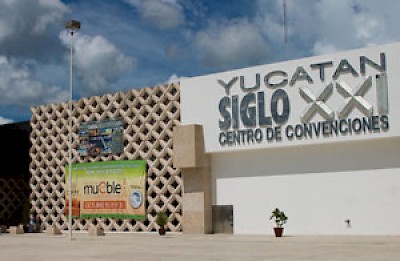
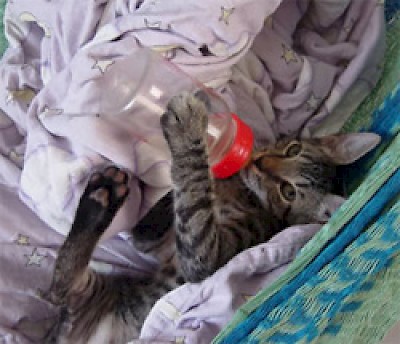
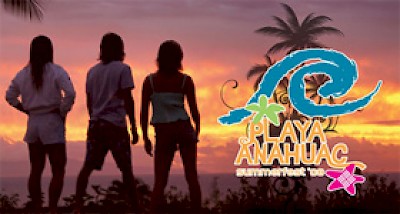
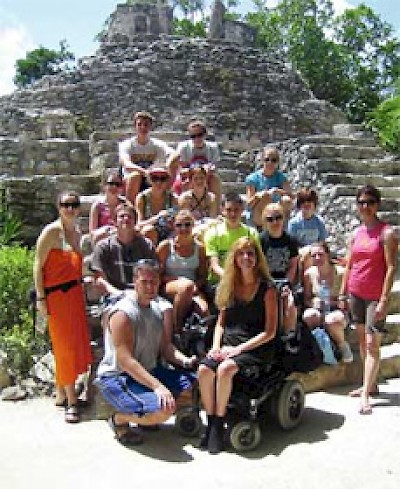



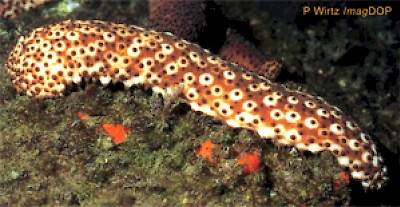
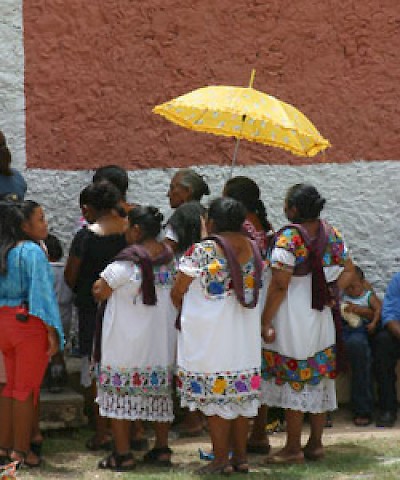

Comments
Khaki Scott 15 years ago
CasiYucateco, Thanks for reminding us that there is more to Nuevo Leon than Monterrey. This is an opportunity to correct some of the tragedies of Katrina. New Orleans was all over the news, while the people of Louisiana's prairie marshes languished under blue tarps and waited for help that never came. Monterrey is one of the most cosmopolitan cities in Mexico - best of everything (except air quality) - but there are many wonderful little towns there, including China, one of my favorites and a fisherman's retirement dream village. Many of these small towns are less than an hour or two from the border and, I know from sad hurricane experience, that they will still need help for a long long time. Perhaps Snowbirds can bring donations as they head south after the storm season ends.
Reply
Working Gringos 15 years ago
It's been raining a lot here in Merida too... of course, Merida is fairly flat and drains pretty well and there are no rivers, so serious flooding is never much of a problem. Yesterday afternoon there was a LOT of rain and many of the streets were flooded... we even found a few on our way home that were closed to traffic because the water was so deep. This morning, though, there are only a few puddles left.
Our hearts go out to those in the Monterrey area...
Reply
CasiYucateco 15 years ago
Along with the well-publicized destruction in Monterrey, smaller towns in Nuevo Leon have been hit very hard. The entire population of Cuidad Anahuac -- 20,000 people -- has been evacuated. All of the city is under water. We are anxiously awaiting more news from friends who live there.
http://thestar.com.my/news/story.asp?file=/2010/7/7/apworld/20100707122803&sec=apworld
With all the damage in Monterrey, we're not sure where they were moved or when they will be able to go home to their smaller town. And there are other cities of four, five, ten thousand people with serious problems as well. If you can afford donations, please help. Thank you!
Reply
(0 to 3 comments)